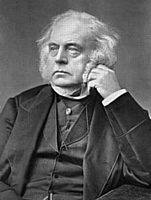SOME FAMOUS ROCHDALIANS you should know about
ROCHDALE can provide a long list of notable people who have found fame or notoriety in many fields of human endeavour. DAME GRACIE FIELDS (1898 - 1979) springs to mind immediately. She sang and acted her way through two world wars to the delight of millions of British souls looking for emotioanl support and spiritual nourishment in some very difficult times. Here are some more names to add to the list and to follow up by clicking on the links:
JOHN BRIGHT (1811 - 1889) was a Radical and Liberal statesman, one of the greatest orators of his generation and a promoter of free trade policies.Bright sat in the House of Commons from 1843 to 1889, promoting free trade, electoral reform and religious freedom. He was almost a lone voice in opposing the Crimean War; he also opposed Gladstone's proposed Home Rule for Ireland. He was a spokesman for the middle class, and strongly opposed to the privileges of the landed aristocracy. In terms of Ireland, he sought to end the political privileges of Anglicans, disestablished the Church of Ireland, and began land reform that would turn land over to the Catholic peasants. He coined the phrase "Mother of Parliaments." as a tribute to England.
CHARLES HOWARTH (1812 - 1968) was the leading 'Rochdale Pioneer', who chaired the original committee that created the first Co-op shop on Toad Lane. It opened on December 24th 1844. So began the International Co-operative Movement which now has over three million consitutent groups throughout the world. Howarth died in poverty. The plaque in Wilton Street, Heywood, which marks the house where he died hardly matches the immense significance of his contribution to commerce with a friendly face turned toward the poor. A name to remember with great affection and pride. As was said at his Funeral:
"We may say that in life he was a useful citizen; a free-thinker in religion; in political and social questions an advanced and consistent reformer; a kind and good husband and father, and a true, constant, and faithful friend... posterity will appreciate his great and disinterested services, and that we and others may be influenced and encouraged to good works by his noble example ever being present in our memory to sustain us in our endeavours"
STEPHEN BUTTERWORTH (1885 - 1958) invented the Butterworth Filter, a class of electrical circuits that are used to separate different frequencies of electrical signals.He was a "Principal Scientific Officer" at the Admiralty Research Laboratory in the Admiralty's Scientific Research and Experiment Department. During World War II, he investigated both magnetic mines and the degaussing of ships (as a means of protecting them from magnetic mines).
SIR PETER OGDEN was educated at Rochdale Grammar School (now Balderstone Technology College).He was awarded a scholarship to University College, Durham in 1965, where he received a BSc in Physics (1968) and a PhD in Theoretical Physics (1971). He continued his education at Harvard Business School, receiving an MBA in Business Studies in 1973.
In 1981 he founded Computacenter with Philip Hulme. He was Executive Chairman of Computacenter between 1981 and 1997 and is now Chairman of the Ogden Trust, which he founded when Computacenter became a UK public company in 1998.
As a philanthropist he established The Ogden Trust in 1999. The Trust works to help bright children from low income backgrounds make the most from the educational system, primarily within the sciences. In 2007 he joined SHINE (at the same time as David Beckham).
Sir Peter was knighted in 2005 for services to education.
EDWIN WAUGH (1817 - 1890) was the son of a shoemaker, After some schooling, he was apprenticed to a printer, Thomas Holden, at the age of 12. While still a young man he worked as a journeyman printer, travelling all over Britain, but eventually returned to his old job in Rochdale. Waugh read eagerly, and in 1847 became assistant secretary to the Lancashire Public School Association and went to work in Manchester. By 1860 he was able to become a full-time writer; but in 1881 he was in poor health and was granted a Civil List pension of £90 p.a
Waugh's Well was built in 1866 to commemorate him at Foe Edge Farm, on the moors above Edenfield, Rossendale where he spent much time writing. Foe Edge, was completely demolished by the North West Water Authority in the mid-1970s and no trace remains of the building
Waugh first attracted attention with sketches of Lancashire life and character in the Manchester Examiner. His first book Sketches of Lancashire Life and Localities was published in 1855 while he was working as a traveller for a Manchester printing firm. He wrote also prose: Factory Folk, Besom Ben Stories, and The Chimney Corner. His Lancashire dialect songs, collected as Poems and Songs (1859), brought him local fame. He has been called "the Lancashire Burns." His most famous poem is "Come whoam to thi childer an' me", 1856
Some other notables, including sportspeople, actors, artists and so on can be discovered by visiting www.ranker.com/list/famous-people-from-rochdale/reference
